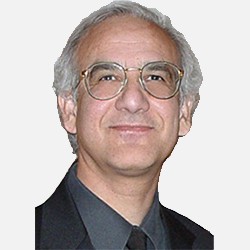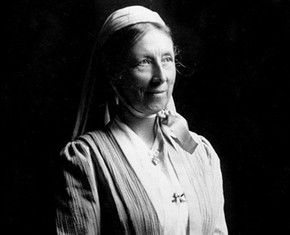The views expressed in our content reflect individual perspectives and do not represent the authoritative views of the Baha'i Faith.
The 12 days of Ridvan, the most important Baha’i festivals, commemorate the first time Baha’u’llah formally unveiled his message and mission – April 21st to May 2nd in 1863.
The most important event of those 12 days locates itself precisely in the very declaratory words of Baha’u’llah on the afternoon of April 21st when he arrived in the garden outside of Baghdad. Fortunately, we know those exact words that he proclaimed on that day, because in a number of his writings he has recounted them. The three words he uttered are:
On the first day of His arrival in the garden designated the Ridvan … the Tongue of Glory uttered three blessed verses.
First, that in this Revelation the use of the sword is prohibited.
Second, that whoso layeth a claim ere the expiration of a thousand years is assuredly in grievous error …
And third, that the one true God, exalted be His Glory, at that very moment shed the splendors of all His Names upon the whole creation.
In one of his tablets, Baha’u’llah described the first day of Ridvan, which means paradise and divine pleasure, as a day in which the two opposite signs of separation and union unite together.
The Ridvan period signaled the day of separation, because on that day the enemies of Baha’u’llah’s new Faith had finally succeeded in convincing the Ottoman authorities to exile Baha’u’llah from Baghdad to a remote place in the empire. On that day, the forces of intolerance, traditionalism, and hatred had apparently triumphed in their attempt to extinguish Baha’u’llah’s light and silence the word of God. Yet, that apparent defeat turned into absolute victory.
On that same day Baha’u’llah received the divine call to proclaim his inner secret, to usher in the Day of God, and to achieve victory over the forces of hatred by affirming a culture of universal love.
So Baha’u’llah’s day of exile became the day of absolute union, and the day of defeat turned into the day of utter victory. Therefore, the days of Ridvan beautifully symbolize the active but non-violent Baha’i response to oppression, of turning injustice into justice, separation into union, a culture of hatred into a culture of love, and hell into paradise.
Ridvan – the supreme paradise – means overcoming oppression through a culture of universal love.
The three statements of Baha’u’llah proclaimed on the first day of Ridvan constitute the manifesto of the Baha’i revelation. Each of the three statements represent a fundamental principle of the Baha’i worldview. Together, they reveal Baha’u’llah’s approach to the world.
The first statement emphasizes the essence of the social teachings of Baha’u’llah; the second unveils his historical consciousness; and the third explains the metaphysical foundation of the uniqueness of this new age and its requirements.
1. Universal Peace
Baha’u’llah’s formal declaration of his mission on the first day of Ridvan affirms the Baha’i culture of peace.
This prohibition of the sword becomes the essence and the core of Baha’u’llah’s social teachings. In addition to forbidding religious coercion and discrimination, Baha’u’llah affirmed the need for universal peace and the oneness of humankind. These teachings would be elaborated in his writings throughout the next 29 years of his revelation. In general, Baha’u’llah believed that the regulating principles of social life must be transformed. Baha’u’llah taught that the culture of the jungle and the rule of prejudice, when one identifies with a particular group and sees others as strangers or enemies, must be replaced by a culture of unity in diversity, universal peace, friendly association with all people of the world, and the oneness of humanity.
2. Historical Consciousness
Baha’u’llah’s second statement both affirms his inception of a new religion, and emphasizes the fact that he is not the last prophet of God.
Instead, Baha’u’llah states, in a thousand years or more a new messenger of God with a new religion will appear in the world. This historical consciousness – namely, the idea that human societies are dynamic and progressive, and therefore, all social institutions need to change over time in accordance with the requirements of the era, including religion – is a categorical rejection of the static culture of traditionalism which reduces humanity to dead objects and ossifies society. Uniquely, the historical consciousness of Baha’u’llah applies this dynamism to the realm of religion and divine revelation as well.
For Baha’u’llah the word of God represents a living reality, which takes new forms throughout history in accordance with the needs of humanity. Religion, then, functions as an ongoing dialogue of God with humanity, and consequently as the capacities and needs of humanity change, this dialogue progressively renews and reconstructs itself. Therefore, the truth of all religions and all the prophets of God is one and the same. But that same divine truth has unlimited, historically-specific manifestations. In other words, religion must cause the development of civilization, and not form an obstacle against such advancement. Baha’u’llah’s first statement abrogated the traditional culture of warfare, avoidance and prejudice, and offered an alternative culture. His second statement reveals the reason for such a transformation – the historical dynamics of the world and of religion.
3. Universal Revelation
Baha’u’llah’s third statement provides the synthesis and the ground of his previous two statements. The first statement brings new commandments for this new age. The second statement affirms the historical nature of the word of God. The third statement unveils the underlying uniqueness of this age.
In his third statement Baha’u’llah said that God “at that very moment” had revealed Himself with all His names and attributes upon all beings. This is indeed a world-historic event. For Baha’u’llah, the truth of everything has ever been and will ever be the reflection of the divine names and attributes.
In other words, everything is spiritual. The truth of all material things is also spiritual, but this truth of everything has remained hidden in human history, a potentiality for perfection previously ignored and unrealized. But this time is a different time. With the declaration of Baha’u’llah, the Day of God begins, the day when the attributes of God are universally revealed by everything. The age has arrived when the inner truth of things becomes a manifest reality. That is the mission and message of Baha’u’llah: to proclaim that the time has come to treat all people and all beings as sacred, beautiful, and endowed with rights. We must see in all people their truth, their divine attributes, and therefore, we need to deal with everyone with respect and dignity.
Baha’u’llah’s third statement also forms the basis of a new conception of human identity. Humanity, so far, has reduced the identity or truth of human beings to factors that separate humans from each other. Place of birth, family, race, gender, social class, caste, age, language, nationality, religion and the like have become the defining features of our identities. But reducing human beings to these particularistic characteristics turns other human groups into strangers or enemies. The oppressors have defined identities in this way, and the battles against oppression have also been waged under the same internalized framework. The result: even to challenge oppression itself can help to perpetuate the logic of oppression and hate.
Baha’u’llah, on the first day of Ridvan, offered humans and all other living things a different concept of identity – as reflections of divine attributes. Therefore, all are one, all are sacred, all are beautiful, all are endowed with rights. The first day of Ridvan announced the inception of a new day, the Day of God, the day of the sanctity of all people, the day of universal love and universal human rights.
















Comments
Sign in or create an account
Continue with Googleor